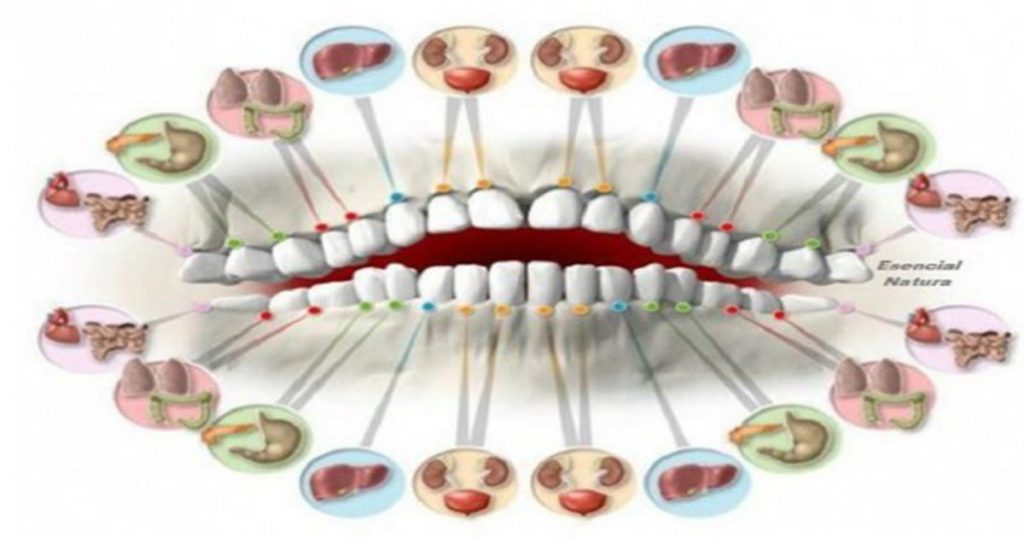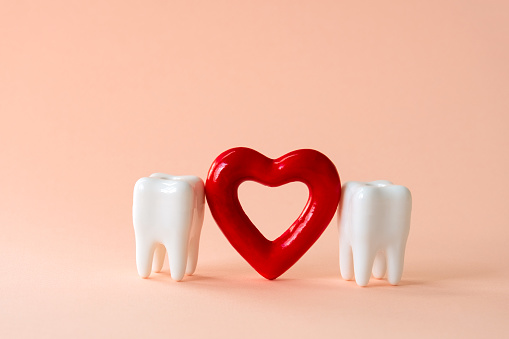Acupuncture practitioners follow a tooth chart of meridians to help their practice. As such, you can use teeth to diagnose and treat the body part to which they are connected. For example, the lower central and lateral incisors are on a meridian connected to the adrenal glands. Hence, sensitivity or pain in these teeth may indicate an imbalance in adrenal function. Given the connection between teeth health and wellness in other parts of your body, following are some maladies that have been associated with certain teeth. A toothache doesn’t necessarily mean that there is a problem elsewhere; however, it is a possibility to explore, especially if discomfort lingers.

Meridians and Teeth
Here are a few meridians that connect to your teeth:
- Incisors and canine teeth are on meridians that connect to the kidney, liver, and gallbladder.
- The meridians from bicuspids and molars are to the large intestine and stomach.
These meridians link various organs, glands, muscles, and joints to your teeth:
• Pain in the upper and lower incisors can indicate kidney, bladder, and ear infections. They may also signal problems with the lymphatic system and reproductive organs.
• Molar pain can indicate anaemia, stomach and intestinal ulcers, chronic gastritis (inflammation of the stomach lining), haemorrhoids, bladder infections, breast health, rheumatism, and chronic inflammation of the pancreas.
• Wisdom teeth, on the other hand, connect to the central nervous system, heart, liver, and intestines. They can also signal high blood pressure, eczema, headache, liver disease, pain in the extremities, and cardiovascular disease.
Your teeth correspond to specific organs and systems. You can find an interactive chart here.
Chi goes in both directions: injured teeth can be a symptom of problems in a faraway body part. A root canal in your second bicuspid (tooth 4) may, therefore, affect breast or lung tissue. Sometimes people experience pain in a tooth that was extracted in the past—known as “phantom pain”. This experience may be the most illustrative of the connection between the teeth and other body parts along meridians: a tooth that is no longer there cannot possibly be causing pain. The organ to which it used to be connected, however, may be the source of your discomfort.
What Studies Are Saying
Many health practitioners believe that there is a connection between oral health and the well-being of the body as a whole.
A 2009 study reported in the journal Dental Aegis reviewed “a new paradigm in dentistry called ‘teeth as sensory organs’”. Mechanoreceptors in teeth control a sequence of neural activities when we eat. They determine how hard and how fast we chew and provide sensory feedback to the brain. Tooth pulp contains mechanoreceptive fibres. “Mechanoreception is the unconscious sensing or conscious perception of touch or mechanical displacement arising from stimuli outside the body. Mechanoreceptors are sensory end organs that respond to mechanical stimuli such as tension, pressure, or vibration.”
Teeth are therefore not inert but important for neural communication, providing unique sensory input that incites other biological processes.
A Finnish study isolated the genes that are responsible for tooth development and found that these same genes are responsible for the development of other organs. In the context of cellular growth and differentiation, genes involved in organ development are an indicator for the potential for cancer later in life. In fact, there is a link between abnormal tooth development and cancer. Researchers have even documented a relationship between bacteria in dental pulp and the formation of breast cancer. Similarly, chronic dental infections contribute to cardiovascular disease, stroke, and erectile dysfunction.
Specific Illnesses
The connections above can be further refined to a particular tooth and illness:
- Pain in the first incisor can be a sign of a prostate or tonsil infection.
- Chronic pain in the canine teeth can be a sign of inflammation of the liver or gallbladder (hepatitis or cholecystitis).
- Bicuspid (premolar) teeth can ache as the result of an allergic reaction, intestinal flora imbalance (dysbacteriosis), pneumonia, or colitis.
- Pain in the fourth teeth (top and bottom) may indicate joint pain and joint disease, like arthritis; also tied to the lungs and large intestine.
- Bottom canine teeth correspond to the circulatory system and pain can be a sign of atherosclerosis or lung dysfunction.
- Pain in the lower molars can indicate varicose veins, polyps in the colon, and respiratory illness (bronchitis, pneumonia, and asthma).
Holistic Dentistry
The growing trend of holistic health has also reached dentistry, which is starting to view teeth in the larger context of full-body health.
“Biological dentistry” is a term coined by the International Academy of Oral Medicine and Toxicology.
“Always seek the safest, least toxic way to accomplish the mission of treatment, all the goals of modern dentistry, and do it while treading as lightly as possible on the patient’s biological terrain. A more biocompatible approach to oral health is the hallmark of biological dentistry.”
A holistic approach to dentistry includes considering the mouth and teeth as part of the rest of the body and not held in isolation. Knowing the connection between teeth and meridians, you may want to find a holistic dentist in your town that will treat your tooth pain in a more complete and comprehensive way.
Reference
Website: https://dailyhealthpost.com/meridian-tooth-chart/2/

